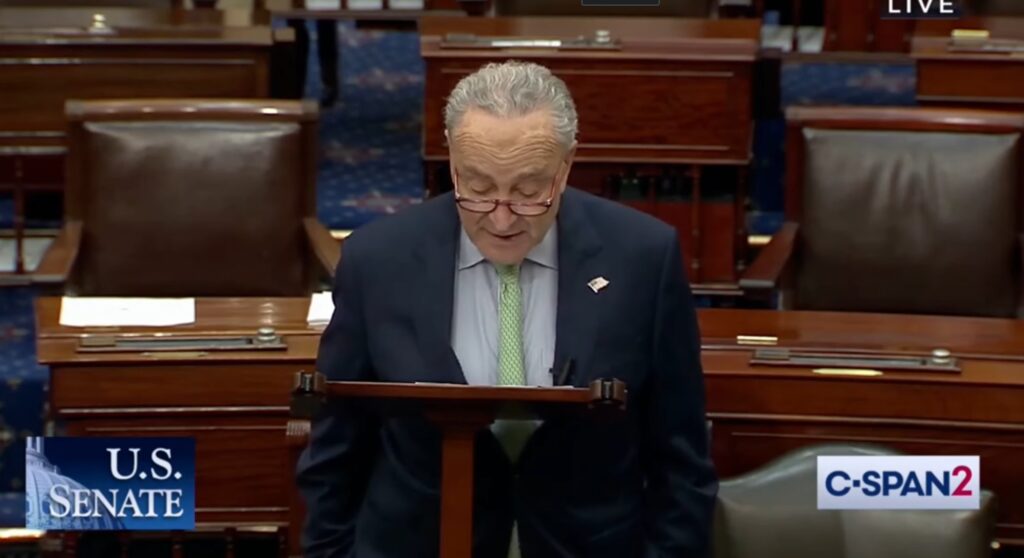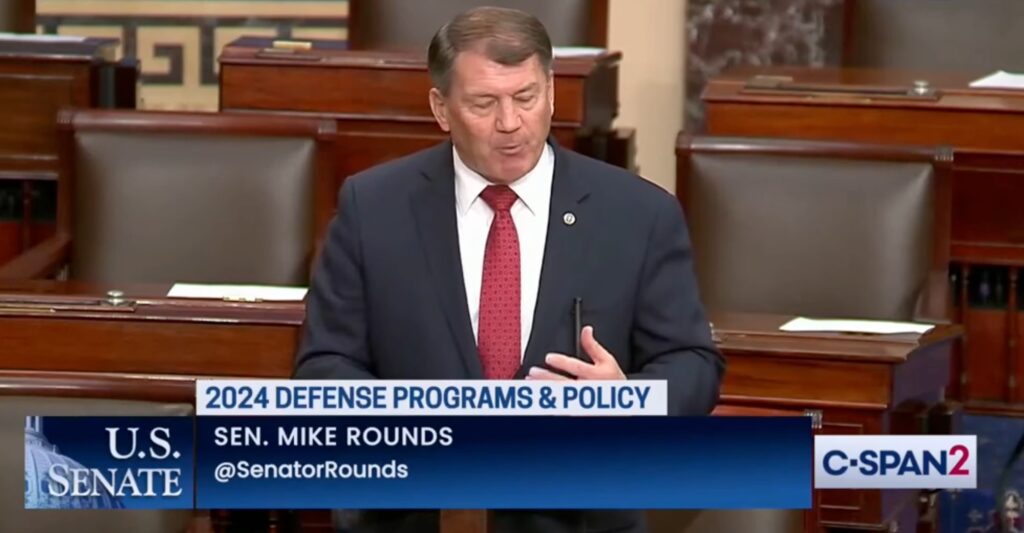Sen. Chuck Schumer and Sen. Mike Rounds had an unprecedented back-and-forth discussion on the Senate floor on December 13, where they spoke about the importance of UFO disclosure and transparency, along with their disappointment in changes made to the UAP Disclosure Act before the National Defense Authorization Act was passed for 2024. (You can read the act in full here.)
A standout part of the discussion included a warning from Schumer, where he said: “We’ve … been notified by multiple credible sources that information on UAPs has also been withheld from Congress, which if true is a violation of the laws.”
The groundbreaking talk between the Democrat and Republican Senator marked a clear recognition of UFO whistleblower David Grusch’s allegations, and a tacit admission that there’s a possibility this is all true.
Below are quotes from their discussion along with videos that you can watch to see the discussion in full.
Interested in learning more about UFOs? The series “Skinwalker Ranch,” along with other UFO-related coverage, can be viewed on the History Channel via a free trial on FrndlyTV (this is an affiliate link.)
Follow us on TheVerifiedReport.com (coming soon) for more UFO & UAP updates.
Schumer Warned: ‘The United States Government Has Gathered a Great Deal of Information About UAPs’
Schumer began his discussion by warning the Senate (and viewers) that the U.S. has information on UAPs that it’s hiding not only from the public, but from Congress, in a clear violation of the law.
“Unidentified unanimous phenomena are of immense interest and curiosity to the American people,” Schumer began. “But with that curiosity comes the risk for confusion, disinformation, and mistrust, especially if the government isn’t prepared to be transparent. The United States government has gathered a great deal of information about UAPs over many decades, but has refused to share it with the American people. That is wrong, and additionally it breeds mistrust.”
He continued, noting that if it’s true that the government is withholding information from Congress, this is a huge issue.
“We’ve also been notified by multiple credible sources that information on UAPs has also been withheld from Congress, which if true is a violation of the laws requiring full notification to the legislative branch, especially as it relates to the four congressional leaders, the defense committees and the intelligence committee,” Schumer said. “So, the bill I worked on with Senator Rounds offered a commonsense solution. Let’s increase transparency on UAPs by using a model that works, by following what … [we] … did 30 years ago with the JFK Nation Collections Act.”
Rounds Said They Wanted to Emulate the JFK Records Act with the New UAP Act
Sen. Mike Rounds also joined the discussion, explaining how the UAP act would have emulated the JFK Records Act if it hadn’t been changed.
“This is an issue that I think has caught the attention of the American people, and most certainly the lack of transparency on the matter, which is of real interest to a lot of the folks that have watched from the outside,” he began. “It brings together, I think, a notable parallel in the withholding of information about items in the government’s possession regarding, in this particular case … President John F. Kennedy. That same approach by government, in terms of the possible withholding of information, brings more questions and more attention to the issue… We wanted to take that same approach with regard to how we could dispel misinformation about UAPs, about … unidentified objects that have come to the attention of the American people. … The UAP Disclosure Act was closely modeled on the JFK Records Act.”
Schumer Said He Was Disappointed With How the House Changed the UAP Disclosure Act

Schumer called out the House for not working hard enough toward transparency, but said progress was still made.
“It’s beyond disappointing that the House refused to work with us on all of the important elements of the UAP Disclosure Act during the NDAA conference,” he opined. “Nevertheless, we did make important progress. For the first time, the National Archives will gather records from across the federal government on UAPs and have a legal mandate to release those records to the public, if appropriate. This is a major, major win for government transparency on UAPs and gives us a strong foundation for more action in the future.”
Rounds said rejecting a review board was a mistake.
“I think probably the most significant shortcomings that we need to visit … were the rejection of a government-wide review board composed of expert citizens, presidentially appointed and Senate confirmed, to control the process of reviewing the records and recommending to the President what records should be released immediately or postponed,” he said.
Rounds Said He Wanted a Requirement that Private Companies Hand Over UAP Material & Biological Remains

A trippy moment was when Rounds brought up the possiblity that some companies have biological remains of aliens. It’s fascinating to note this is now being discussed openly on the Senate floor.
“And a requirement as a transparency measure for the government to obtain any recovered UAP material or biological remains that may have been provided to private entities in the past and thereby hidden from Congress and the American people,” Rounds said, speaking of another provision that was removed from the Act. “We are lacking oversight opportunities, and we are not fulfilling our responsibilities.”
Schumer Said the Fight Isn’t Over for a Review Board
Schumer said they aren’t giving up and will keeping work on the proposal for a review board.
“It’s essential we keep working on our proposal, to control and create an independent, presidentially appointed board to oversee these records and create a system to release them where appropriate to the public,” Schumer said. “As the Senator said, it’s the same method used for the JFK records, and it continues to work to this very day. It is really an outrage the House didn’t work with us on adopting our proposal for review board, which by definition is bipartisan in the Senate.”
Without a review board, the same groups that have hidden UAP knowledge will continue to have that power, he added.
“Now it means that declassification of UAP records will be largely up to the same entities that blocked, obfuscated their disclosure for decades,” Schumer warned. “I want to assure the American people, Senator Rounds and I will keep working to change the status quo. Before I yield finally to him, I would like to acknowledge my dear friend, the late Harry Reid, a mentor, who cared about this a great deal. He is looking down and smiling, but also importuning us to get this done, which we will do everything we can to make happen.”
Rounds addressed the concern that the review board might “go too far.”
“To those who think that the citizen review board that would have been created in our UAP Disclosure Act would be unprecedented and somehow go too far, we note that the proposed review board was very closely modeled on the review board established in the JFK Assassination Records Act of 1992, which has successfully guided the release of records to the American public on another very sensitive matter of high interest to the American people,” he said.
Rounds Noted That Agencies Outside the Department of Defense Have Collected UAP Information
Rounds noted that they believe agencies outside the Department of Defense have collected UAP data, and a review board would help get at that information.
“And it [the review board] does one more thing that we really need to recognize, and that is that there is, we believe, information and data that has been collected by more than just the Department of Defense, but by other agencies of the federal government as well,” Rounds said. “And by allowing for an outside, independent collection of these records we can make progress in terms of dispelling myths and providing accurate information to the American people.”
Schumer concluded by saying: “Again, I thank my colleague and pledge to work with him and other bipartisan colleagues in the future to build upon what we’ve achieved in the conference report. We encourage our colleagues to join us in the further investigation of this issue, and in advancing legislation that will complete what we have accomplished in this NDAA. I yield the floor.”
This work by Stephanie Dwilson is licensed under CC BY-ND 4.0. Please note that this license does not include photos or videos that may be in the story.

